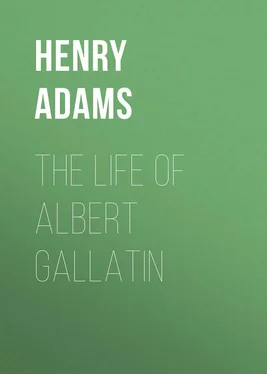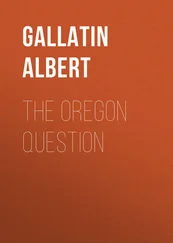Henry Adams - The Life of Albert Gallatin
Здесь есть возможность читать онлайн «Henry Adams - The Life of Albert Gallatin» — ознакомительный отрывок электронной книги совершенно бесплатно, а после прочтения отрывка купить полную версию. В некоторых случаях можно слушать аудио, скачать через торрент в формате fb2 и присутствует краткое содержание. Жанр: foreign_antique, foreign_prose, на английском языке. Описание произведения, (предисловие) а так же отзывы посетителей доступны на портале библиотеки ЛибКат.
- Название:The Life of Albert Gallatin
- Автор:
- Жанр:
- Год:неизвестен
- ISBN:нет данных
- Рейтинг книги:4 / 5. Голосов: 1
-
Избранное:Добавить в избранное
- Отзывы:
-
Ваша оценка:
- 80
- 1
- 2
- 3
- 4
- 5
The Life of Albert Gallatin: краткое содержание, описание и аннотация
Предлагаем к чтению аннотацию, описание, краткое содержание или предисловие (зависит от того, что написал сам автор книги «The Life of Albert Gallatin»). Если вы не нашли необходимую информацию о книге — напишите в комментариях, мы постараемся отыскать её.
The Life of Albert Gallatin — читать онлайн ознакомительный отрывок
Ниже представлен текст книги, разбитый по страницам. Система сохранения места последней прочитанной страницы, позволяет с удобством читать онлайн бесплатно книгу «The Life of Albert Gallatin», без необходимости каждый раз заново искать на чём Вы остановились. Поставьте закладку, и сможете в любой момент перейти на страницу, на которой закончили чтение.
Интервал:
Закладка:
On the subject of his Congressional service Mr. Gallatin left two fragmentary memoranda, which may best find place here:
“As both that body [Congress] and the State Legislature sat in Philadelphia, owing also to my short attendance in the United States Senate and my defence of my seat, I was as well known to the members of Congress as their own colleagues, and at once took my stand in that Assembly. The first great debate in which we were engaged was that on the British treaty; and my speech, or rather two speeches, on the constitutional powers of the House, miserably reported and curtailed by B. F. Bache, were, whether I was right or wrong, universally considered as the best on either side. I think that of Mr. Madison superior and more comprehensive, but for this very reason (comprehensiveness) less impressive than mine. Griswold’s reply was thought the best; in my opinion it was that of Goodrich, though this was deficient in perspicuity. Both, however, were second-rate. The most brilliant and eloquent speech was undoubtedly that of Mr. Ames; but it was delivered in reference to the expediency of making the appropriations, and treated but incidentally of the constitutional question. I may here say that though there were, during my six years of Congressional service, many clever men in the Federal party in the House (Griswold, Bayard, Harper, Otis, Smith of South Carolina, Dana, Tracy, Hillhouse, Sitgreaves, &c.), I met with but two superior men, Ames, who sat only during the session of 1795-1796, and John Marshall, who sat only in the session of 1799-1800, and who took an active part in the debates only two or three times, but always with great effect. On our side we were much stronger in the Congress of 1795-1797. But Mr. Madison and Giles (an able commonplace debater) having withdrawn, and Richard Brent become hypochondriac, we were reduced during the important Congress of 1797-1799 to Ed. Livingston, John Nicholas, and myself, whilst the Federalists received the accession of Bayard and Otis. John Marshall came in addition for the Congress of 1799-1801, and we were recruited by John Randolph and Joseph Nicholson.”
“The ground which I occupied in that body [Congress] is well known, and I need not dwell on the share I took in all the important debates and on the great questions which during that period (1795-1801) agitated the public mind, in 1796 the British treaty, in 1798-1800 the hostilities with France and the various unnecessary and obnoxious measures by which the Federal party destroyed itself. It is certainly a subject of self-gratulation that I should have been allowed to take the lead with such coadjutors as Madison, Giles, Livingston, and Nicholas, and that when deprived of the powerful assistance of the two first, who had both withdrawn in 1798, I was able to contend on equal terms with the host of talents collected in the Federal party, – Griswold, Bayard, Harper, Goodrich, Otis, Smith, Sitgreaves, Dana, and even J. Marshall. Yet I was destitute of eloquence, and had to surmount the great obstacle of speaking in a foreign language, with a very bad pronunciation. My advantages consisted in laborious investigation, habits of analysis, thorough knowledge of the subjects under discussion, and more extensive general information, due to an excellent early education, to which I think I may add quickness of apprehension and a sound judgment.
“A member of the opposition during the whole period, it could not have been expected that many important measures should have been successfully introduced by me. Yet an impulse was given in some respects which had a powerful influence on the spirit and leading principles of subsequent Administrations. The principal questions in which I was engaged related to constitutional construction or to the finances. Though not quite so orthodox on the first subject as my Virginia friends (witness the United States Bank and internal improvements), I was opposed to any usurpation of powers by the general government. But I was specially jealous of Executive encroachments, and to keep that branch within the strict limits of Constitution and of law, allowing no more discretion than what appeared strictly necessary, was my constant effort.
“The financial department in the House was quite vacant, so far at least as the opposition was concerned; and having made myself complete master of the subject and occupied that field almost exclusively, it is not astonishing that my views should have been adopted by the Republican party and been acted upon when they came into power. My first step was to have a standing committee of ways and means appointed. That this should not have been sooner done proves the existing bias in favor of increasing as far as possible the power of the Executive branch. The next thing was to demonstrate that the expenditure had till then exceeded the income: the remedy proposed was economy. Economy means order and skill; and after having determined the proper and necessary objects of expense, the Legislature cannot enforce true economy otherwise than by making specific appropriations. Even these must be made with due knowledge of the subject, since, if carried too far by too many subdivisions, they become injurious, if not impracticable. This subject has ever been a bone of contention between the legislative and executive branches in every representative government, and it is in reality the only proper and efficient legislative check on executive prodigality.
“Respecting the objects of expenditure, there was not, apart from that connected with the French hostilities, any other subject of division but that of the navy. And the true question was whether the creation of an efficient navy should be postponed to the payment of the public debt.” …
1796.During Mr. Gallatin’s maiden session of Congress, the exciting winter of 1795-96, when the first of our great party contests took place, not even a private letter seems to have been written by him that throws light on his acts or thoughts. His wife was with him in Philadelphia. If he wrote confidentially to any other person, his letters are now lost. The only material for his biography is in the Annals of Congress and in his speeches, with the replies they provoked; a material long since worn threadbare by biographers and historians.
Of all portions of our national history none has been more often or more carefully described and discussed than the struggle over Mr. Jay’s treaty. No candid man can deny that there was at the time ample room for honest difference of opinion in regard to the national policy. That Mr. Jay’s treaty was a bad one few persons even then ventured to dispute; no one would venture on its merits to defend it now. There has been no moment since 1810 when the United States would have hesitated to prefer war rather than peace on such terms. No excuse in the temporary advantages which the treaty gained can wholly palliate the concessions of principle which it yielded, and no considerations of a possible war with England averted or postponed can blind history to the fact that this blessing of peace was obtained by the sacrifice of national consistency and by the violation of neutrality towards France. The treaty recognized the right of Great Britain to capture French property in American vessels, whilst British property in the same situation was protected from capture by our previous treaty with France; and, what was yet worse, the acknowledgment that provisions might be treated as contraband not only contradicted all our principles, but subjected the United States government to the charge of a mean connivance in the British effort to famish France, while securing America from pecuniary loss.
Nevertheless, for good and solid reasons, the Senate at the time approved, and President Washington, after long deliberation, signed, the treaty. The fear of a war with Great Britain, the desire to gain possession of the Western posts, and the commercial interests involved in a neutral trade daily becoming more lucrative, were the chief motives to this course. So far as Mr. Gallatin’s private opinions were concerned, it is probable that no one felt much more aversion to the treaty than he did; but before he took his seat in Congress the Senate had approved and the President had signed it; a strong feeling in its favor existed among his own constituents, always in dread of Indian difficulties; the treaty, in short, was law, and the House had only to consider the legislation necessary to carry it into effect.
Читать дальшеИнтервал:
Закладка:
Похожие книги на «The Life of Albert Gallatin»
Представляем Вашему вниманию похожие книги на «The Life of Albert Gallatin» списком для выбора. Мы отобрали схожую по названию и смыслу литературу в надежде предоставить читателям больше вариантов отыскать новые, интересные, ещё непрочитанные произведения.
Обсуждение, отзывы о книге «The Life of Albert Gallatin» и просто собственные мнения читателей. Оставьте ваши комментарии, напишите, что Вы думаете о произведении, его смысле или главных героях. Укажите что конкретно понравилось, а что нет, и почему Вы так считаете.












